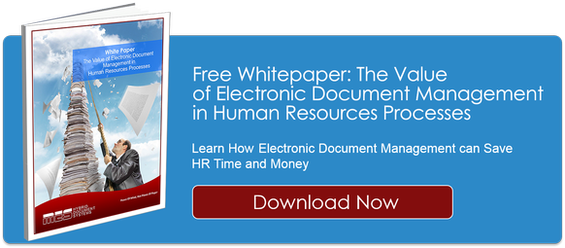Employee records management is an important aspect for any organization, regardless of industry or size. Since people are the most important element to the success of a business, effective management is criticaal – and the purpose of creating and retaining employee documentation is to improve the management of employees.
 Essentially, employee records provide a single source where data about each employee is stored, and this information is used to help guide HR decision processes to the benefit of the organization, such as hiring, promotions, compensation and even termination.
Essentially, employee records provide a single source where data about each employee is stored, and this information is used to help guide HR decision processes to the benefit of the organization, such as hiring, promotions, compensation and even termination.
But that’s not the only thing about employee records that demonstrates why effective employee records management is pivotal. Below are some other facts about employee records that may not have crossed your mind, but nevertheless are important to know.
Like other business records, employee records are subject to a retention period for the purpose of regulatory and legal compliance.
-
Outdated employee records can have a significant adverse impact on organizations as non-current information may be used for decisions about employees. If records are outdated, they are not serving the purpose they are being collected for.
-
Employment records can be subpoenaed for complaints or lawsuits, which reinforces the importance of ensuring that information is accurate, professional and is not misused. It also demonstrates why an active, effective record retention policy is a necessity.
-
Organizations must comply with Canada’s Personal Information Protection and Electronic Documents Act (PIPEDA) with their employee records. Much of the information organizations collect about employees is personal information (name, address, Social Insurance Number, etc.) and is thus protected under this legislation. Noncompliance can result is serious penalties.
-
Employees have the right to access and review their employee records. In order to facilitate access but also maintain the integrity of the employee records, organizations need to establish an efficient access process.
-
Security issues with employee records can result in litigation, particularly if a data breach resulted in demonstrable harm to the employee (ie. identity theft).
-
Poor employee records management can affect your bottom line through poor workforce management (improper tracking of sick days, overtime, vacation time, etc).
-
Employee records are used to keep on top of important benchmarks like performance/salary reviews and re-certifications. If employee records are not adequately managed and maintained, these can easily be overlooked.
To put it simply, poor employee records management processes are bad for business. They are a detriment to workforce management, but can also affect the bottom line and leave businesses susceptible to legal repercussions. Employee records should be treated with the same care as other business-critical files – with a strong document management system that ensures accurate and efficient records management.

